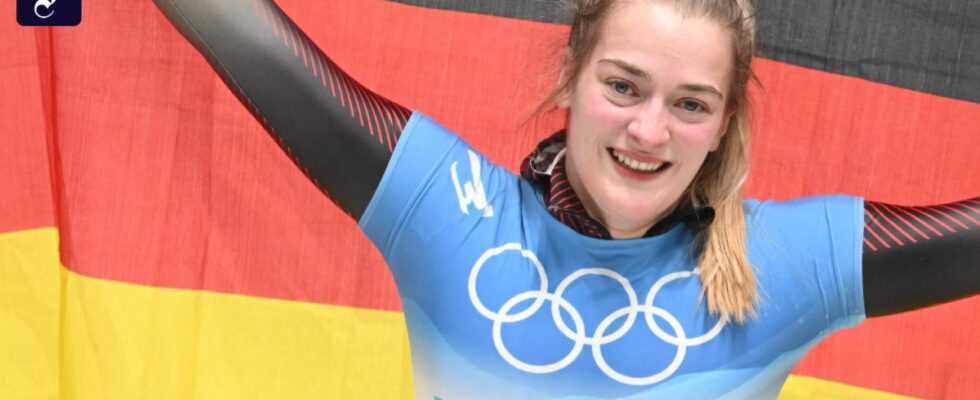NStill incredulous, Hannah Neise clapped her hands over her head and then showed her gold medal, almost embarrassed. The 21-year-old from Winterberg surprisingly raced to become the first German skeleton pilot to win the Olympics and continued the famous winning streak in the Yanqing Gold Canal. After four Olympic victories in the luge competitions and the triumph of skeleton world champion Christopher Grotheer, Neise was also unbeatable.
“I can’t really realize what just happened here. In any case, it’s an indescribable feeling,” said Neise. “I woke up at six o’clock this morning and was very nervous. I wrote directly to my mom and she said: ‘I should trust in what I can do.’” She is happy inside, “parents, family members and friends are more happy”. Head coach Christian Baude praised: “Hannah can drive very well. She makes few mistakes and when she does make one, she stays calm. It feels really good to drive.”
The youngest in the team had messed up the start of the Olympic races and was only eighth. But already in the second run, Neise rushed to second place, took the lead in the third run with a track record of 1:01.44 minutes and went one better in the final. With the best running time and ultimately 0.62 seconds ahead of the surprising second Jaclyn Narracott from Australia.
“She had no pressure at all and just did her thing. I have the greatest respect for what she has been doing here for the past two days,” said Jacqueline Lölling. The Pyeongchang second was only eighth, the Dutch Kimberly Bos won bronze ahead of world champion Tina Hermann from WSV Königssee.
“We can be proud of that”
“The medals are good for our sport. We’re always a bit in the background, now we’ve shown what we’re capable of. We can be proud of that,” said Lölling. “It’s a completely new situation for me that we’ve won all the races,” said the CEO and sports director of the bobsleigh and sled association for Germany, Thomas Schwab. “I’ve been there for a long time, but I’ve never experienced that.”
Neise had just made it to China. She only got the ticket by finishing eighth at the season finale in St. Moritz. And like her teammate Axel Jungk, Neise tested positive for the corona virus after the World Cup race in Switzerland at the end of January. While Jungk raced to silver behind Grotheer on Friday, Neise made it all the way to the top.
Neise had already taken second place in the test races in Yanqing in October. As always, she followed her dress code for the big coup. Under the racing suit she wore compression stockings and a pink T-shirt. As a lucky charm, she brought a cuddly toy from her friend, a ski jumper, to the Winter Games.
Only at home in Schmallenberg did things not go as planned. The public viewing organized by Dad and the advertising community Schmallenberg on Schützenplatz had to be reduced at short notice. The construction of the event stage was canceled due to safety concerns in accordance with the current Corona Protection Ordinance. Nevertheless, around 150 people gathered in front of two screens in the third run.
The German women had won Olympic medals before the races north of Beijing, but had never climbed to the top of the podium. Kerstin Szymkowiak won silver in Vancouver in 2019, Anja Huber (today Selbach) took bronze. Four years ago in Pyeongchang, Jacqueline Lölling was only beaten by Brit Elizabeth Yarnold.
